Sustainable and Responsible Tourism: Difference, Origin, and Priorities
VerifiedAdded on 2022/11/13
|7
|1903
|396
AI Summary
This article discusses the difference between sustainable and responsible tourism, the origin and background of UNWTO, and their priorities for promoting sustainable and responsible tourism. It also explains the importance of conserving natural resources, evaluating social and economic well-being, and contributing to the well-being of maintaining the harmony in the environment for conservation and preservation of resources for tourists. The article also highlights the importance of making tourism better for people living and making a better place for visiting.
Contribute Materials
Your contribution can guide someone’s learning journey. Share your
documents today.
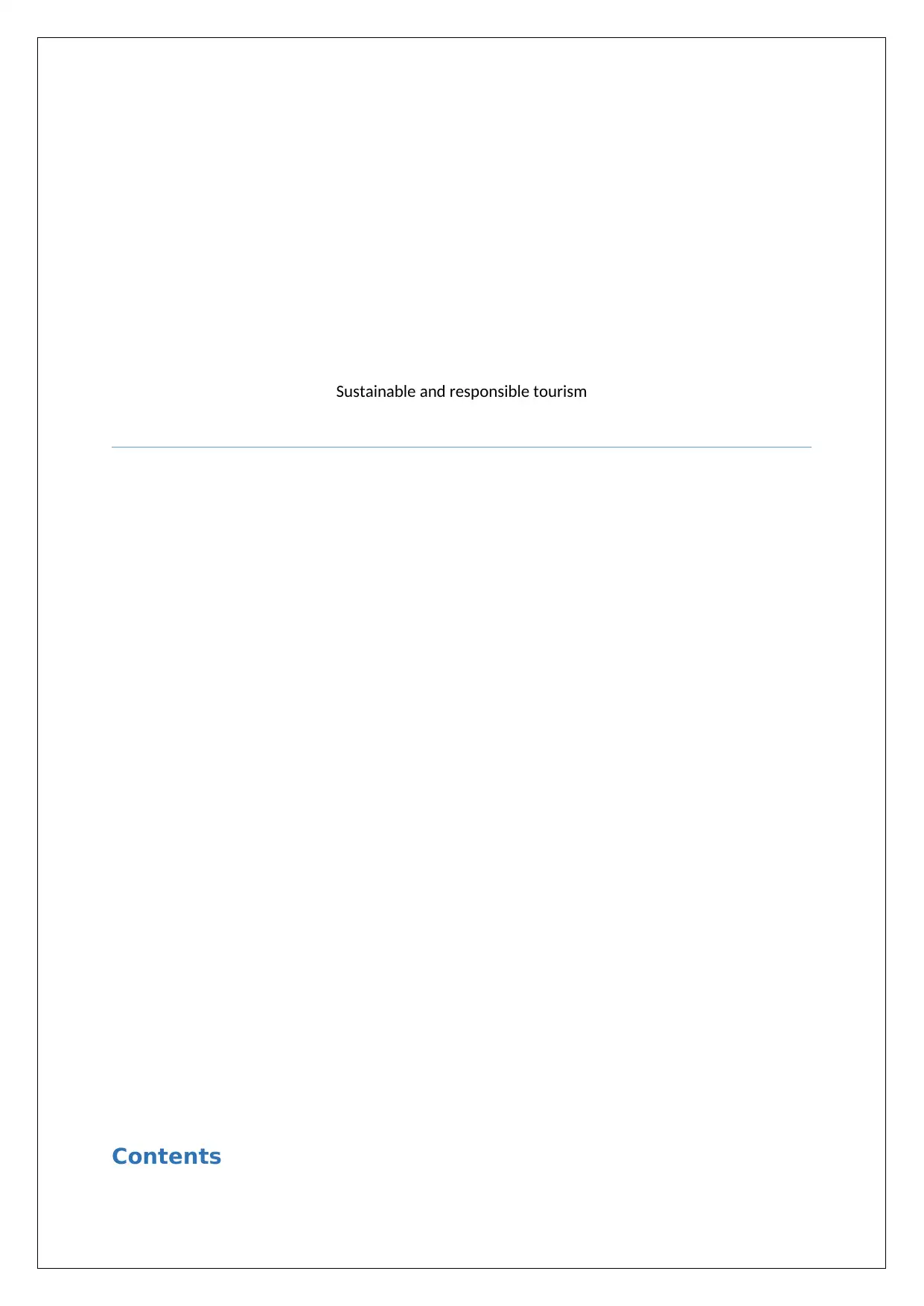
Sustainable and responsible tourism
Contents
Contents
Secure Best Marks with AI Grader
Need help grading? Try our AI Grader for instant feedback on your assignments.
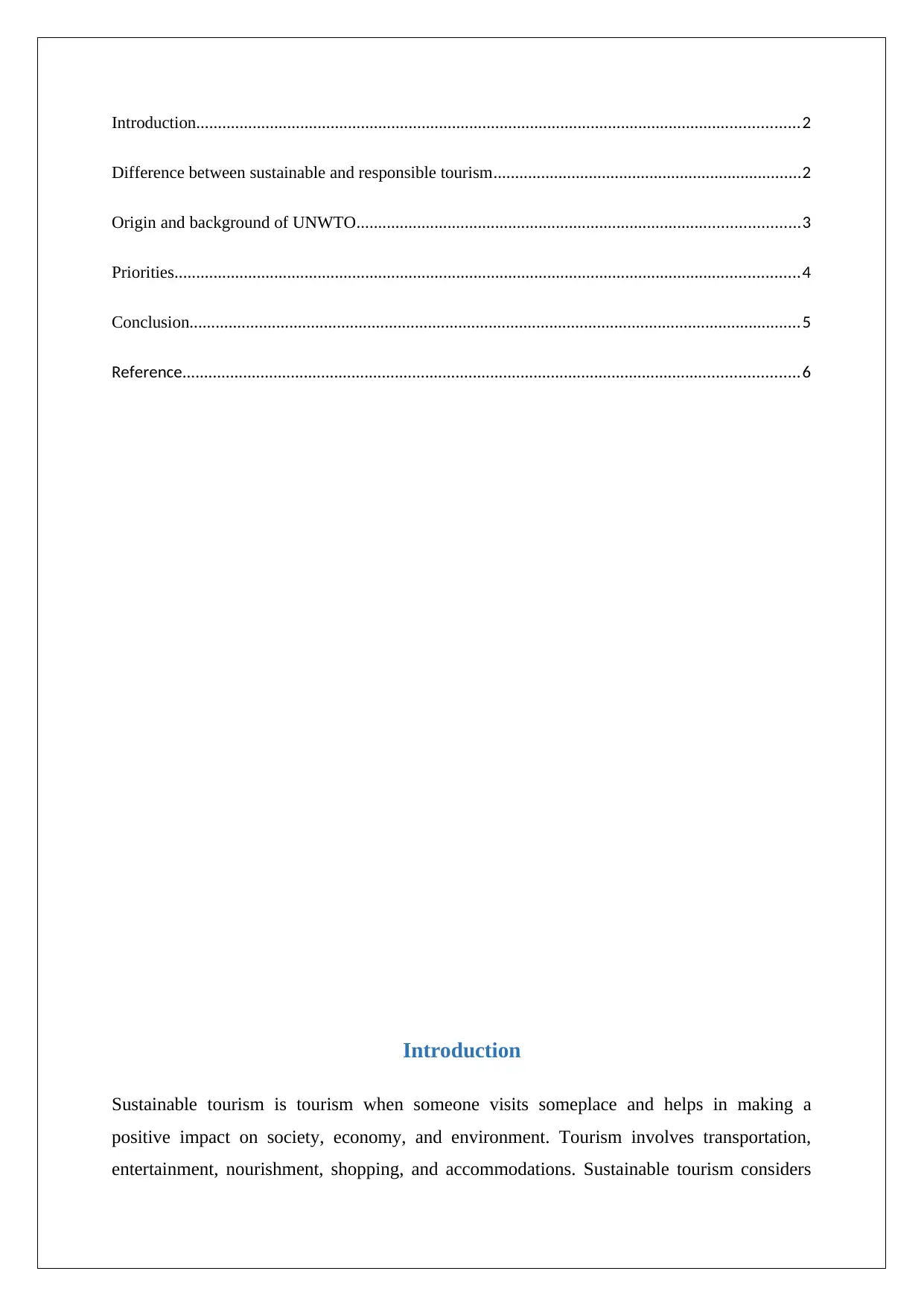
Introduction...........................................................................................................................................2
Difference between sustainable and responsible tourism.......................................................................2
Origin and background of UNWTO......................................................................................................3
Priorities................................................................................................................................................4
Conclusion.............................................................................................................................................5
Reference..............................................................................................................................................6
Introduction
Sustainable tourism is tourism when someone visits someplace and helps in making a
positive impact on society, economy, and environment. Tourism involves transportation,
entertainment, nourishment, shopping, and accommodations. Sustainable tourism considers
Difference between sustainable and responsible tourism.......................................................................2
Origin and background of UNWTO......................................................................................................3
Priorities................................................................................................................................................4
Conclusion.............................................................................................................................................5
Reference..............................................................................................................................................6
Introduction
Sustainable tourism is tourism when someone visits someplace and helps in making a
positive impact on society, economy, and environment. Tourism involves transportation,
entertainment, nourishment, shopping, and accommodations. Sustainable tourism considers
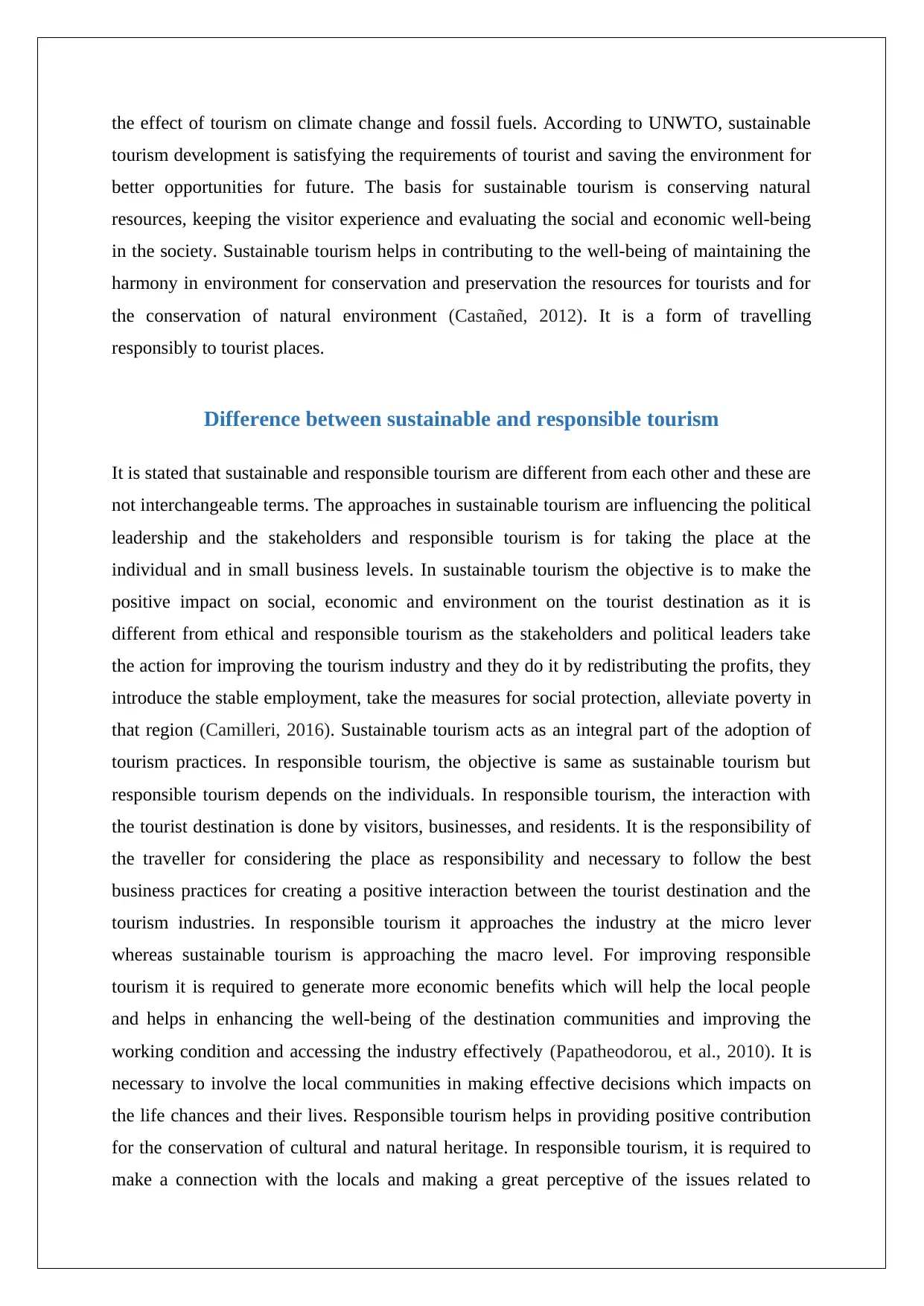
the effect of tourism on climate change and fossil fuels. According to UNWTO, sustainable
tourism development is satisfying the requirements of tourist and saving the environment for
better opportunities for future. The basis for sustainable tourism is conserving natural
resources, keeping the visitor experience and evaluating the social and economic well-being
in the society. Sustainable tourism helps in contributing to the well-being of maintaining the
harmony in environment for conservation and preservation the resources for tourists and for
the conservation of natural environment (Castañed, 2012). It is a form of travelling
responsibly to tourist places.
Difference between sustainable and responsible tourism
It is stated that sustainable and responsible tourism are different from each other and these are
not interchangeable terms. The approaches in sustainable tourism are influencing the political
leadership and the stakeholders and responsible tourism is for taking the place at the
individual and in small business levels. In sustainable tourism the objective is to make the
positive impact on social, economic and environment on the tourist destination as it is
different from ethical and responsible tourism as the stakeholders and political leaders take
the action for improving the tourism industry and they do it by redistributing the profits, they
introduce the stable employment, take the measures for social protection, alleviate poverty in
that region (Camilleri, 2016). Sustainable tourism acts as an integral part of the adoption of
tourism practices. In responsible tourism, the objective is same as sustainable tourism but
responsible tourism depends on the individuals. In responsible tourism, the interaction with
the tourist destination is done by visitors, businesses, and residents. It is the responsibility of
the traveller for considering the place as responsibility and necessary to follow the best
business practices for creating a positive interaction between the tourist destination and the
tourism industries. In responsible tourism it approaches the industry at the micro lever
whereas sustainable tourism is approaching the macro level. For improving responsible
tourism it is required to generate more economic benefits which will help the local people
and helps in enhancing the well-being of the destination communities and improving the
working condition and accessing the industry effectively (Papatheodorou, et al., 2010). It is
necessary to involve the local communities in making effective decisions which impacts on
the life chances and their lives. Responsible tourism helps in providing positive contribution
for the conservation of cultural and natural heritage. In responsible tourism, it is required to
make a connection with the locals and making a great perceptive of the issues related to
tourism development is satisfying the requirements of tourist and saving the environment for
better opportunities for future. The basis for sustainable tourism is conserving natural
resources, keeping the visitor experience and evaluating the social and economic well-being
in the society. Sustainable tourism helps in contributing to the well-being of maintaining the
harmony in environment for conservation and preservation the resources for tourists and for
the conservation of natural environment (Castañed, 2012). It is a form of travelling
responsibly to tourist places.
Difference between sustainable and responsible tourism
It is stated that sustainable and responsible tourism are different from each other and these are
not interchangeable terms. The approaches in sustainable tourism are influencing the political
leadership and the stakeholders and responsible tourism is for taking the place at the
individual and in small business levels. In sustainable tourism the objective is to make the
positive impact on social, economic and environment on the tourist destination as it is
different from ethical and responsible tourism as the stakeholders and political leaders take
the action for improving the tourism industry and they do it by redistributing the profits, they
introduce the stable employment, take the measures for social protection, alleviate poverty in
that region (Camilleri, 2016). Sustainable tourism acts as an integral part of the adoption of
tourism practices. In responsible tourism, the objective is same as sustainable tourism but
responsible tourism depends on the individuals. In responsible tourism, the interaction with
the tourist destination is done by visitors, businesses, and residents. It is the responsibility of
the traveller for considering the place as responsibility and necessary to follow the best
business practices for creating a positive interaction between the tourist destination and the
tourism industries. In responsible tourism it approaches the industry at the micro lever
whereas sustainable tourism is approaching the macro level. For improving responsible
tourism it is required to generate more economic benefits which will help the local people
and helps in enhancing the well-being of the destination communities and improving the
working condition and accessing the industry effectively (Papatheodorou, et al., 2010). It is
necessary to involve the local communities in making effective decisions which impacts on
the life chances and their lives. Responsible tourism helps in providing positive contribution
for the conservation of cultural and natural heritage. In responsible tourism, it is required to
make a connection with the locals and making a great perceptive of the issues related to
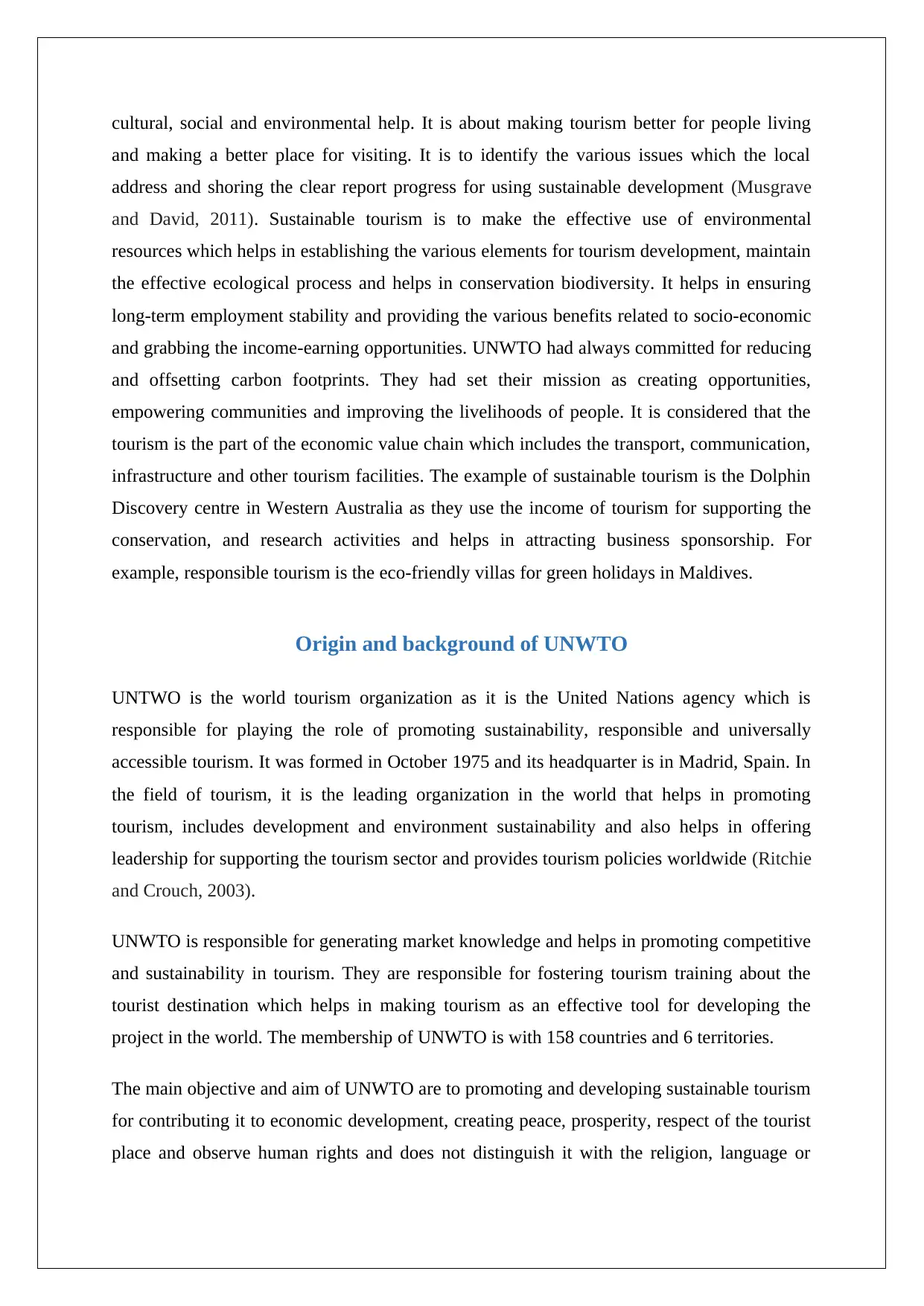
cultural, social and environmental help. It is about making tourism better for people living
and making a better place for visiting. It is to identify the various issues which the local
address and shoring the clear report progress for using sustainable development (Musgrave
and David, 2011). Sustainable tourism is to make the effective use of environmental
resources which helps in establishing the various elements for tourism development, maintain
the effective ecological process and helps in conservation biodiversity. It helps in ensuring
long-term employment stability and providing the various benefits related to socio-economic
and grabbing the income-earning opportunities. UNWTO had always committed for reducing
and offsetting carbon footprints. They had set their mission as creating opportunities,
empowering communities and improving the livelihoods of people. It is considered that the
tourism is the part of the economic value chain which includes the transport, communication,
infrastructure and other tourism facilities. The example of sustainable tourism is the Dolphin
Discovery centre in Western Australia as they use the income of tourism for supporting the
conservation, and research activities and helps in attracting business sponsorship. For
example, responsible tourism is the eco-friendly villas for green holidays in Maldives.
Origin and background of UNWTO
UNTWO is the world tourism organization as it is the United Nations agency which is
responsible for playing the role of promoting sustainability, responsible and universally
accessible tourism. It was formed in October 1975 and its headquarter is in Madrid, Spain. In
the field of tourism, it is the leading organization in the world that helps in promoting
tourism, includes development and environment sustainability and also helps in offering
leadership for supporting the tourism sector and provides tourism policies worldwide (Ritchie
and Crouch, 2003).
UNWTO is responsible for generating market knowledge and helps in promoting competitive
and sustainability in tourism. They are responsible for fostering tourism training about the
tourist destination which helps in making tourism as an effective tool for developing the
project in the world. The membership of UNWTO is with 158 countries and 6 territories.
The main objective and aim of UNWTO are to promoting and developing sustainable tourism
for contributing it to economic development, creating peace, prosperity, respect of the tourist
place and observe human rights and does not distinguish it with the religion, language or
and making a better place for visiting. It is to identify the various issues which the local
address and shoring the clear report progress for using sustainable development (Musgrave
and David, 2011). Sustainable tourism is to make the effective use of environmental
resources which helps in establishing the various elements for tourism development, maintain
the effective ecological process and helps in conservation biodiversity. It helps in ensuring
long-term employment stability and providing the various benefits related to socio-economic
and grabbing the income-earning opportunities. UNWTO had always committed for reducing
and offsetting carbon footprints. They had set their mission as creating opportunities,
empowering communities and improving the livelihoods of people. It is considered that the
tourism is the part of the economic value chain which includes the transport, communication,
infrastructure and other tourism facilities. The example of sustainable tourism is the Dolphin
Discovery centre in Western Australia as they use the income of tourism for supporting the
conservation, and research activities and helps in attracting business sponsorship. For
example, responsible tourism is the eco-friendly villas for green holidays in Maldives.
Origin and background of UNWTO
UNTWO is the world tourism organization as it is the United Nations agency which is
responsible for playing the role of promoting sustainability, responsible and universally
accessible tourism. It was formed in October 1975 and its headquarter is in Madrid, Spain. In
the field of tourism, it is the leading organization in the world that helps in promoting
tourism, includes development and environment sustainability and also helps in offering
leadership for supporting the tourism sector and provides tourism policies worldwide (Ritchie
and Crouch, 2003).
UNWTO is responsible for generating market knowledge and helps in promoting competitive
and sustainability in tourism. They are responsible for fostering tourism training about the
tourist destination which helps in making tourism as an effective tool for developing the
project in the world. The membership of UNWTO is with 158 countries and 6 territories.
The main objective and aim of UNWTO are to promoting and developing sustainable tourism
for contributing it to economic development, creating peace, prosperity, respect of the tourist
place and observe human rights and does not distinguish it with the religion, language or
Secure Best Marks with AI Grader
Need help grading? Try our AI Grader for instant feedback on your assignments.
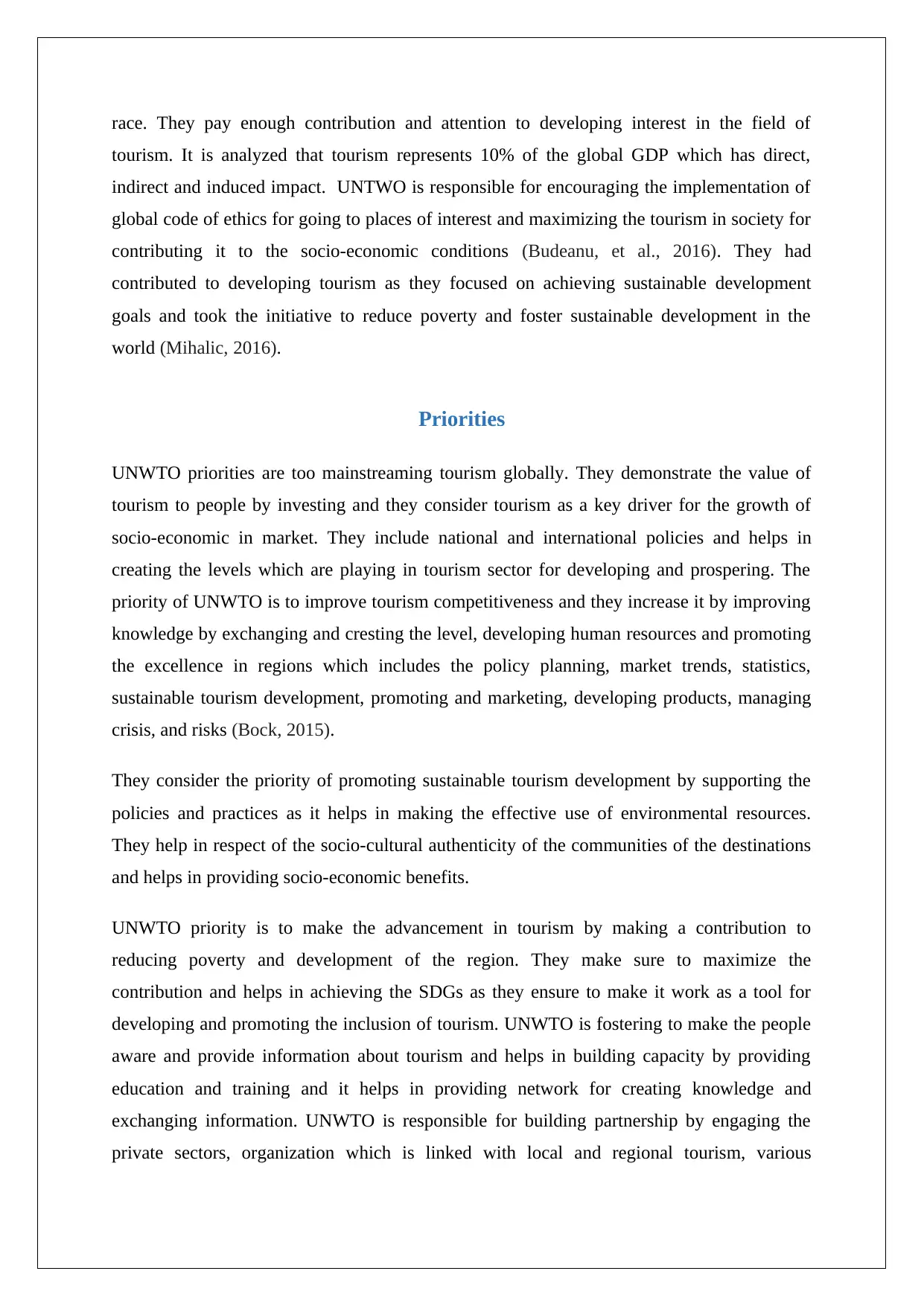
race. They pay enough contribution and attention to developing interest in the field of
tourism. It is analyzed that tourism represents 10% of the global GDP which has direct,
indirect and induced impact. UNTWO is responsible for encouraging the implementation of
global code of ethics for going to places of interest and maximizing the tourism in society for
contributing it to the socio-economic conditions (Budeanu, et al., 2016). They had
contributed to developing tourism as they focused on achieving sustainable development
goals and took the initiative to reduce poverty and foster sustainable development in the
world (Mihalic, 2016).
Priorities
UNWTO priorities are too mainstreaming tourism globally. They demonstrate the value of
tourism to people by investing and they consider tourism as a key driver for the growth of
socio-economic in market. They include national and international policies and helps in
creating the levels which are playing in tourism sector for developing and prospering. The
priority of UNWTO is to improve tourism competitiveness and they increase it by improving
knowledge by exchanging and cresting the level, developing human resources and promoting
the excellence in regions which includes the policy planning, market trends, statistics,
sustainable tourism development, promoting and marketing, developing products, managing
crisis, and risks (Bock, 2015).
They consider the priority of promoting sustainable tourism development by supporting the
policies and practices as it helps in making the effective use of environmental resources.
They help in respect of the socio-cultural authenticity of the communities of the destinations
and helps in providing socio-economic benefits.
UNWTO priority is to make the advancement in tourism by making a contribution to
reducing poverty and development of the region. They make sure to maximize the
contribution and helps in achieving the SDGs as they ensure to make it work as a tool for
developing and promoting the inclusion of tourism. UNWTO is fostering to make the people
aware and provide information about tourism and helps in building capacity by providing
education and training and it helps in providing network for creating knowledge and
exchanging information. UNWTO is responsible for building partnership by engaging the
private sectors, organization which is linked with local and regional tourism, various
tourism. It is analyzed that tourism represents 10% of the global GDP which has direct,
indirect and induced impact. UNTWO is responsible for encouraging the implementation of
global code of ethics for going to places of interest and maximizing the tourism in society for
contributing it to the socio-economic conditions (Budeanu, et al., 2016). They had
contributed to developing tourism as they focused on achieving sustainable development
goals and took the initiative to reduce poverty and foster sustainable development in the
world (Mihalic, 2016).
Priorities
UNWTO priorities are too mainstreaming tourism globally. They demonstrate the value of
tourism to people by investing and they consider tourism as a key driver for the growth of
socio-economic in market. They include national and international policies and helps in
creating the levels which are playing in tourism sector for developing and prospering. The
priority of UNWTO is to improve tourism competitiveness and they increase it by improving
knowledge by exchanging and cresting the level, developing human resources and promoting
the excellence in regions which includes the policy planning, market trends, statistics,
sustainable tourism development, promoting and marketing, developing products, managing
crisis, and risks (Bock, 2015).
They consider the priority of promoting sustainable tourism development by supporting the
policies and practices as it helps in making the effective use of environmental resources.
They help in respect of the socio-cultural authenticity of the communities of the destinations
and helps in providing socio-economic benefits.
UNWTO priority is to make the advancement in tourism by making a contribution to
reducing poverty and development of the region. They make sure to maximize the
contribution and helps in achieving the SDGs as they ensure to make it work as a tool for
developing and promoting the inclusion of tourism. UNWTO is fostering to make the people
aware and provide information about tourism and helps in building capacity by providing
education and training and it helps in providing network for creating knowledge and
exchanging information. UNWTO is responsible for building partnership by engaging the
private sectors, organization which is linked with local and regional tourism, various
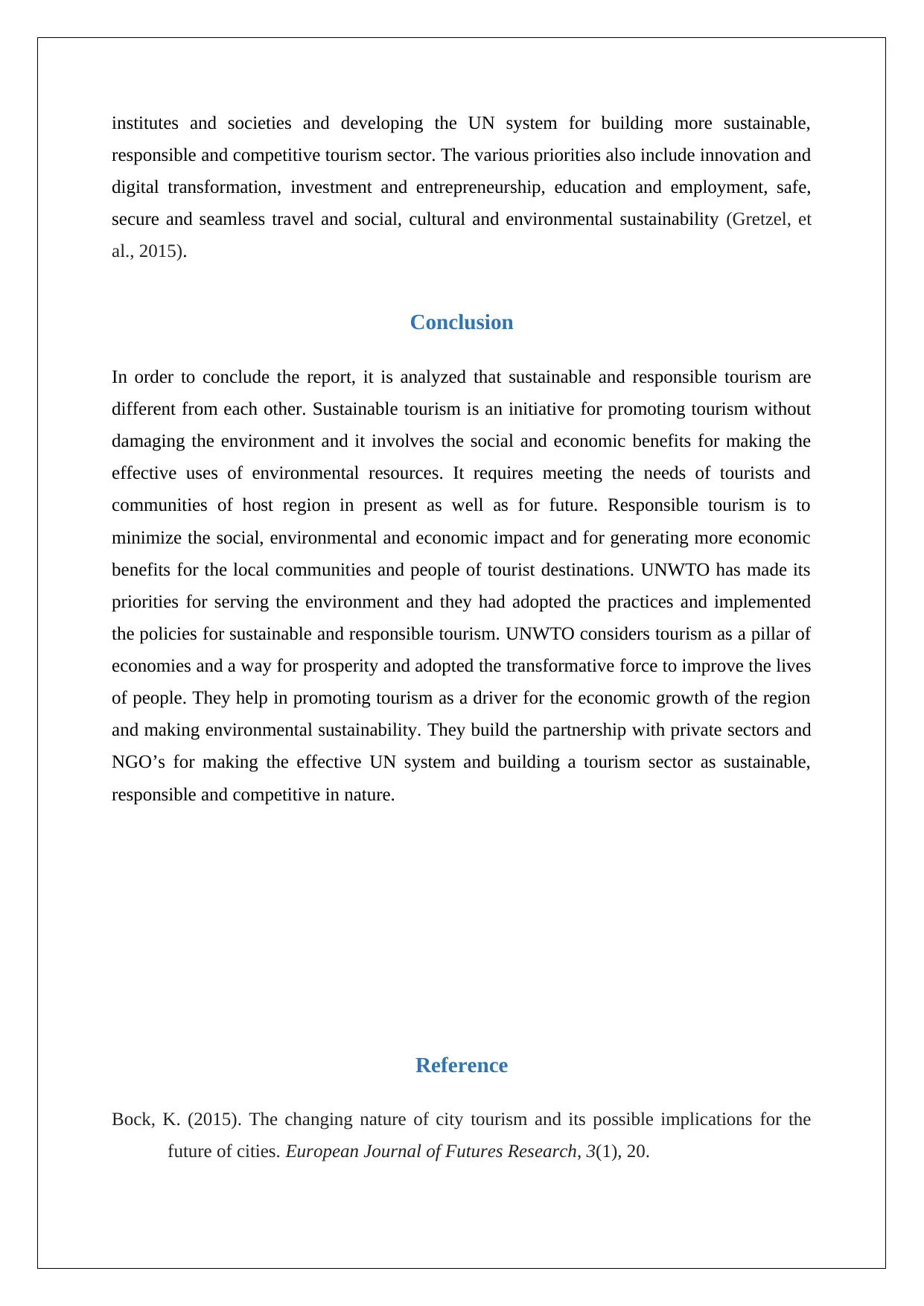
institutes and societies and developing the UN system for building more sustainable,
responsible and competitive tourism sector. The various priorities also include innovation and
digital transformation, investment and entrepreneurship, education and employment, safe,
secure and seamless travel and social, cultural and environmental sustainability (Gretzel, et
al., 2015).
Conclusion
In order to conclude the report, it is analyzed that sustainable and responsible tourism are
different from each other. Sustainable tourism is an initiative for promoting tourism without
damaging the environment and it involves the social and economic benefits for making the
effective uses of environmental resources. It requires meeting the needs of tourists and
communities of host region in present as well as for future. Responsible tourism is to
minimize the social, environmental and economic impact and for generating more economic
benefits for the local communities and people of tourist destinations. UNWTO has made its
priorities for serving the environment and they had adopted the practices and implemented
the policies for sustainable and responsible tourism. UNWTO considers tourism as a pillar of
economies and a way for prosperity and adopted the transformative force to improve the lives
of people. They help in promoting tourism as a driver for the economic growth of the region
and making environmental sustainability. They build the partnership with private sectors and
NGO’s for making the effective UN system and building a tourism sector as sustainable,
responsible and competitive in nature.
Reference
Bock, K. (2015). The changing nature of city tourism and its possible implications for the
future of cities. European Journal of Futures Research, 3(1), 20.
responsible and competitive tourism sector. The various priorities also include innovation and
digital transformation, investment and entrepreneurship, education and employment, safe,
secure and seamless travel and social, cultural and environmental sustainability (Gretzel, et
al., 2015).
Conclusion
In order to conclude the report, it is analyzed that sustainable and responsible tourism are
different from each other. Sustainable tourism is an initiative for promoting tourism without
damaging the environment and it involves the social and economic benefits for making the
effective uses of environmental resources. It requires meeting the needs of tourists and
communities of host region in present as well as for future. Responsible tourism is to
minimize the social, environmental and economic impact and for generating more economic
benefits for the local communities and people of tourist destinations. UNWTO has made its
priorities for serving the environment and they had adopted the practices and implemented
the policies for sustainable and responsible tourism. UNWTO considers tourism as a pillar of
economies and a way for prosperity and adopted the transformative force to improve the lives
of people. They help in promoting tourism as a driver for the economic growth of the region
and making environmental sustainability. They build the partnership with private sectors and
NGO’s for making the effective UN system and building a tourism sector as sustainable,
responsible and competitive in nature.
Reference
Bock, K. (2015). The changing nature of city tourism and its possible implications for the
future of cities. European Journal of Futures Research, 3(1), 20.
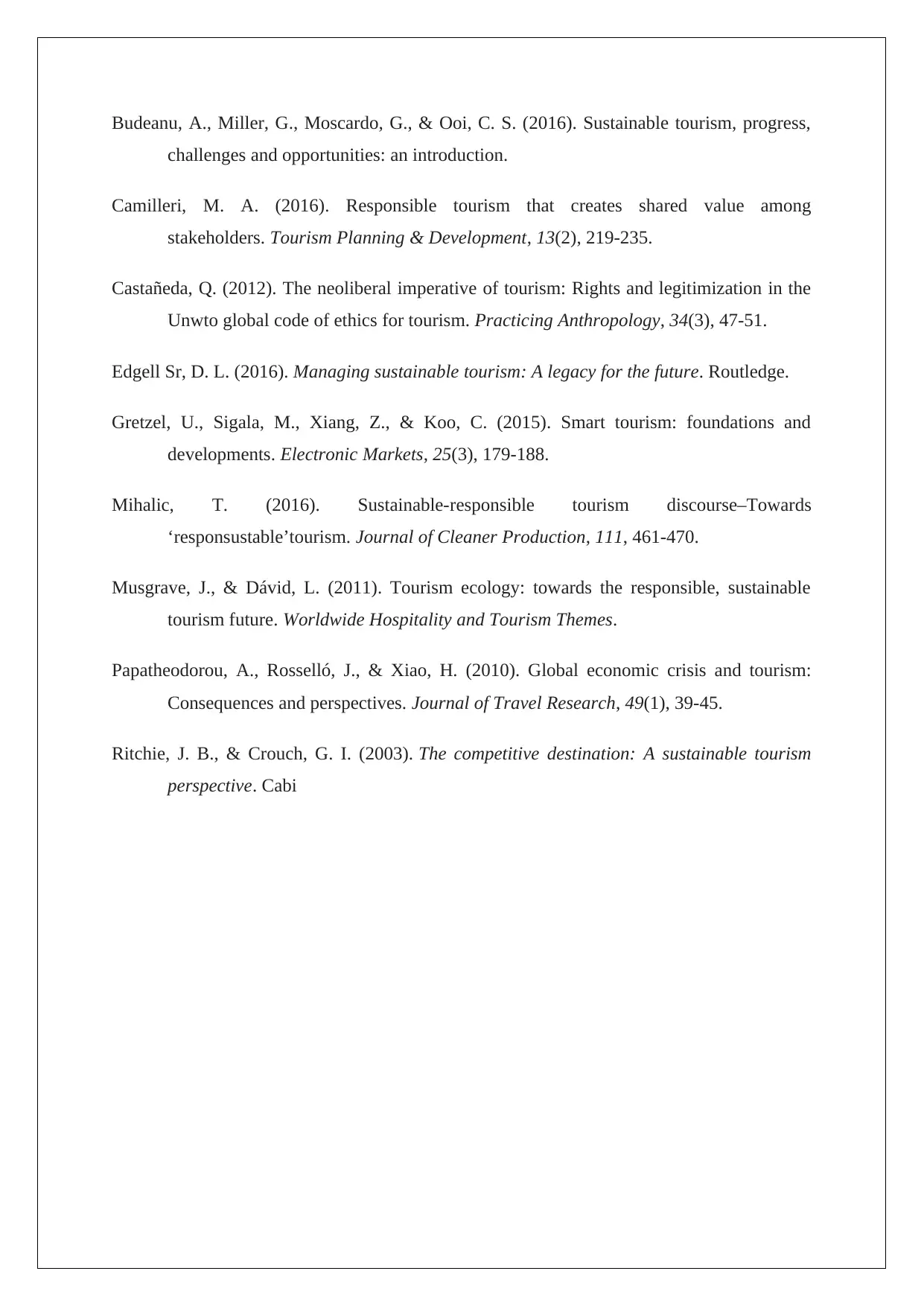
Budeanu, A., Miller, G., Moscardo, G., & Ooi, C. S. (2016). Sustainable tourism, progress,
challenges and opportunities: an introduction.
Camilleri, M. A. (2016). Responsible tourism that creates shared value among
stakeholders. Tourism Planning & Development, 13(2), 219-235.
Castañeda, Q. (2012). The neoliberal imperative of tourism: Rights and legitimization in the
Unwto global code of ethics for tourism. Practicing Anthropology, 34(3), 47-51.
Edgell Sr, D. L. (2016). Managing sustainable tourism: A legacy for the future. Routledge.
Gretzel, U., Sigala, M., Xiang, Z., & Koo, C. (2015). Smart tourism: foundations and
developments. Electronic Markets, 25(3), 179-188.
Mihalic, T. (2016). Sustainable-responsible tourism discourse–Towards
‘responsustable’tourism. Journal of Cleaner Production, 111, 461-470.
Musgrave, J., & Dávid, L. (2011). Tourism ecology: towards the responsible, sustainable
tourism future. Worldwide Hospitality and Tourism Themes.
Papatheodorou, A., Rosselló, J., & Xiao, H. (2010). Global economic crisis and tourism:
Consequences and perspectives. Journal of Travel Research, 49(1), 39-45.
Ritchie, J. B., & Crouch, G. I. (2003). The competitive destination: A sustainable tourism
perspective. Cabi
challenges and opportunities: an introduction.
Camilleri, M. A. (2016). Responsible tourism that creates shared value among
stakeholders. Tourism Planning & Development, 13(2), 219-235.
Castañeda, Q. (2012). The neoliberal imperative of tourism: Rights and legitimization in the
Unwto global code of ethics for tourism. Practicing Anthropology, 34(3), 47-51.
Edgell Sr, D. L. (2016). Managing sustainable tourism: A legacy for the future. Routledge.
Gretzel, U., Sigala, M., Xiang, Z., & Koo, C. (2015). Smart tourism: foundations and
developments. Electronic Markets, 25(3), 179-188.
Mihalic, T. (2016). Sustainable-responsible tourism discourse–Towards
‘responsustable’tourism. Journal of Cleaner Production, 111, 461-470.
Musgrave, J., & Dávid, L. (2011). Tourism ecology: towards the responsible, sustainable
tourism future. Worldwide Hospitality and Tourism Themes.
Papatheodorou, A., Rosselló, J., & Xiao, H. (2010). Global economic crisis and tourism:
Consequences and perspectives. Journal of Travel Research, 49(1), 39-45.
Ritchie, J. B., & Crouch, G. I. (2003). The competitive destination: A sustainable tourism
perspective. Cabi
1 out of 7
Related Documents
Your All-in-One AI-Powered Toolkit for Academic Success.
+13062052269
info@desklib.com
Available 24*7 on WhatsApp / Email
![[object Object]](/_next/static/media/star-bottom.7253800d.svg)
Unlock your academic potential
© 2024 | Zucol Services PVT LTD | All rights reserved.


